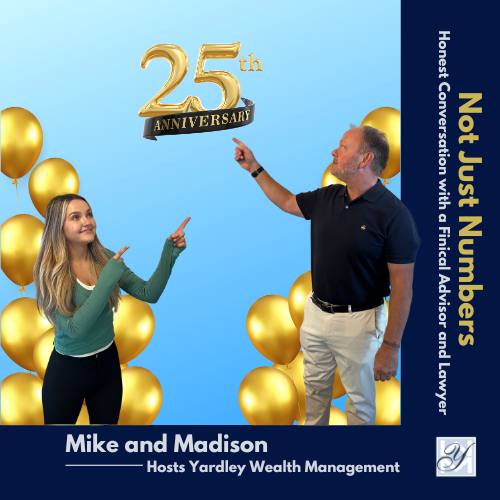Episode 12: Mike Reflects on 25 Years!
Hosts: Madison Demora and Mike Garry
Episode Overview
Madison and Mike celebrated two anniversaries, one marking Mike’s 25th year in the financial industry and the other commemorating his fifth year since completing an IRONMAN triathlon. Mike shared his journey from being a law school graduate struggling to establishing his career to moving to the financial industry. He also shared his experience of transitioning from being a wire house broker, to an independent financial advisor to starting his own firm, Yardley Wealth Management, and the challenges he faced. Mike emphasized the importance of continuous learning and adapting to changing circumstances, and the role of supporting communities in achieving goals, such as the IRONMAN community.
Listen to Our Podcast On:
Key Points and Timestamps
- 00:00 – 03:04 – Introduction of episode topic: Mike reflects on 25 years
- 03:05 – 09:08 – Career Beginnings
- 09:09 –18:40 – Significant Career Moments
- 18:41 – 33:02 – Inspirations and Advice to Younger Generation Entering this career field
- 33:03 – 41:06– IRONMAN Anniversary: Training and Challenges
- 41:07 – 45:55 – Lessons Learned
- 45:56 – 48:18 – Advice for Aspiring Participants
Episode 12: Mike Reflects on 25 Years
In this special episode of “Not Just Numbers: Honest Conversations with a Financial Advisor and Lawyer,” host Madison Demora sits down with Mike Garry to commemorate two significant milestones. Mike, the founder and CEO of Yardley Wealth Management and an estate planning lawyer, reflects on his 25-year journey in the financial industry and the five-year anniversary of completing IRONMAN Maryland.
Join us as Mike shares candid insights into his career’s beginnings, the challenges he faced, and the pivotal moments that shaped his professional life. From starting at Merrill Lynch to founding his own independent, fee-only advisory firm, he discusses the importance of taking the long view in one’s career, embracing change, and the value of perseverance. His experiences offer valuable lessons for both seasoned professionals and those just starting in the industry.
But it’s not all about finance. Mike also delves into his personal achievement of completing the grueling IRONMAN triathlon. He opens up about the physical and emotional challenges of training for and participating in such an intense event, and how this experience parallels the determination required in his professional life. His story is a testament to setting ambitious goals and relentlessly pursuing them, no matter the obstacles.
Whether you’re interested in financial planning, career development, or inspiring personal stories, this episode offers a wealth of knowledge and motivation. Don’t miss out on this heartfelt conversation that bridges the gap between personal ambition and professional success. Tune in to gain insights that could help shape your own journey.
Follow Us on Social Media
Stay updated with the latest episodes and news by following us on social media:



